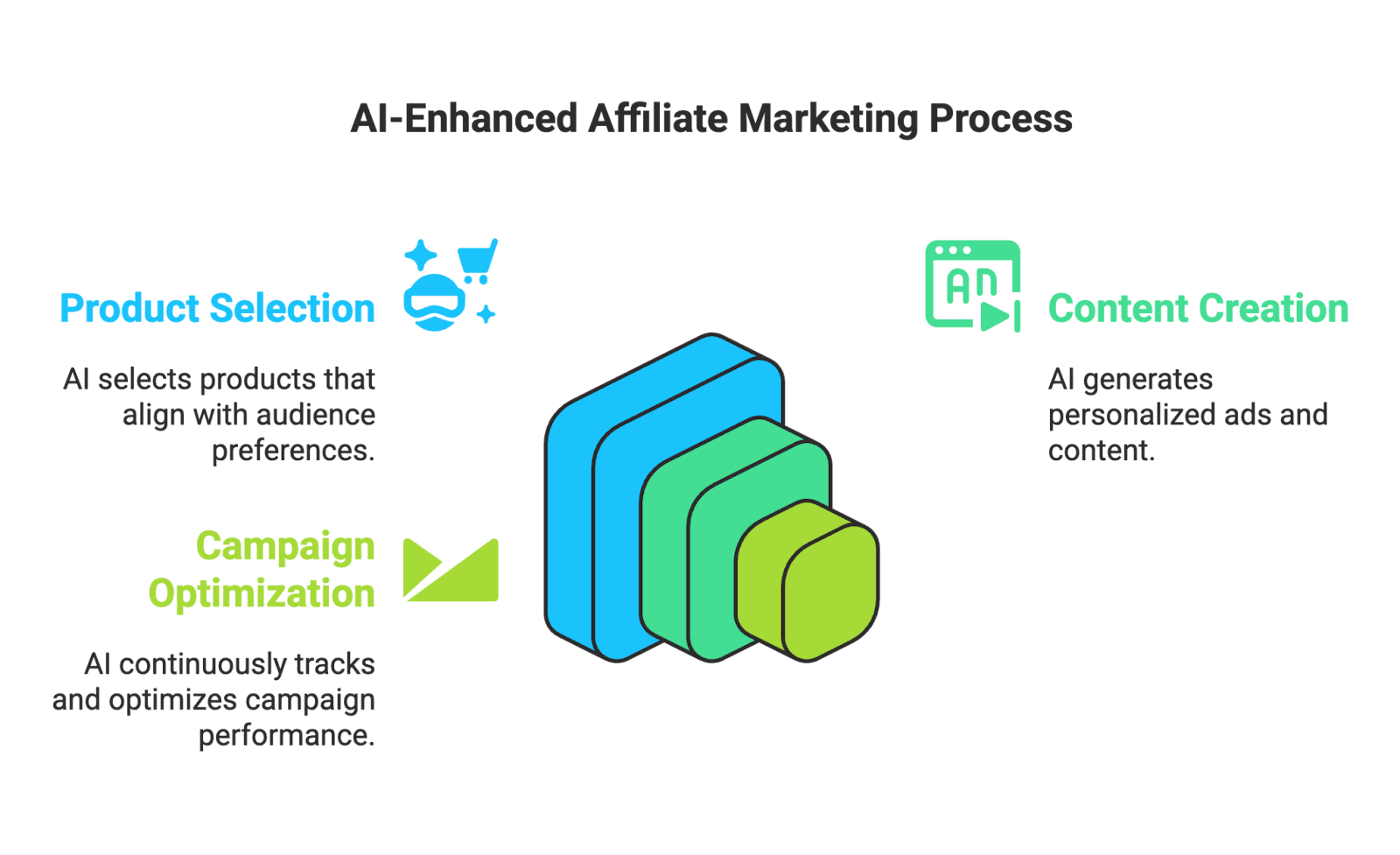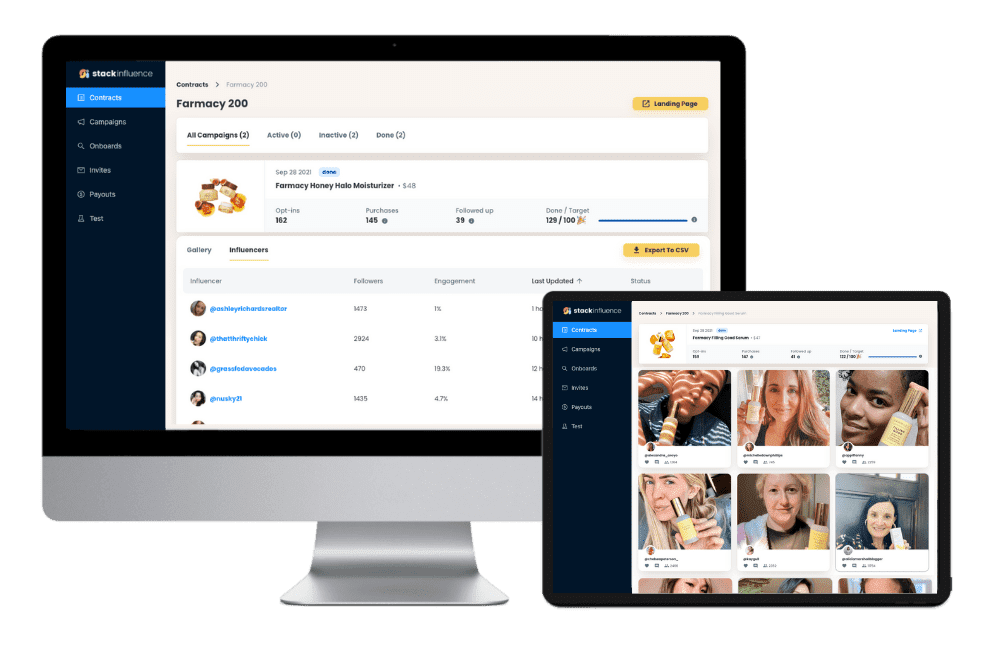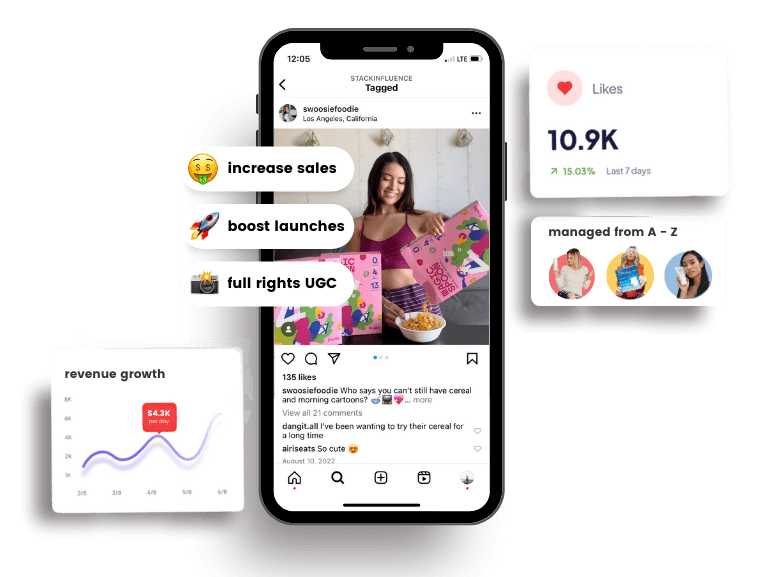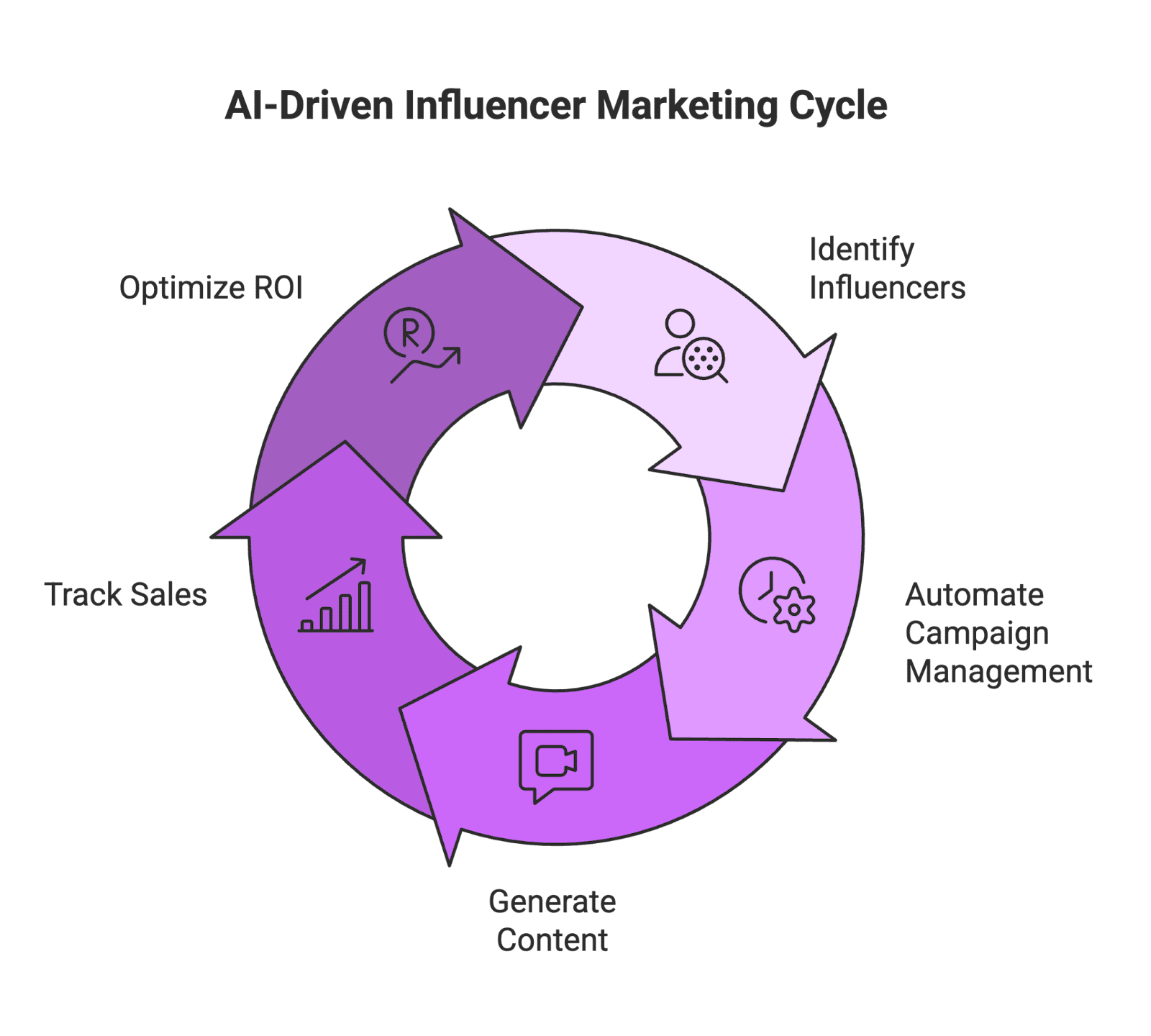What Is AI Affiliate Marketing? A Comprehensive Guide for E-Commerce Brands
16th
July, 2025
Influencer Marketing
Amazon Marketplace
Artificial Intelligence
TikTok Tips
Affiliate marketing has become a powerhouse in digital commerce – as of 2025, the industry is worth around $37.3 billion globally and on track to hit $48 billion by 2027. In the U.S. alone, affiliate programs drive 16% of all online orders, making them a key revenue channel for e-commerce brands. Now, artificial intelligence (AI) is reshaping how this revenue is generated. In fact, experts estimate that over 50% of digital marketing strategies will leverage AI by 2025 – meaning affiliate marketers must adapt to these innovations or risk falling behind.
Chart: Global affiliate marketing industry market size (USD billions) from 2016 to 2027 (projected). The affiliate industry has seen rapid growth in recent years and is expected to reach $48 billion by 2027.
With affiliate marketing already widely adopted by over 80% of brands and publishers and offering an average $12 return for every $1 spent, adding AI into the mix opens up new frontiers. AI tools can automate tedious tasks, pinpoint the perfect audience, and even generate content – all of which can supercharge your affiliate program’s performance. In this guide, we’ll break down what AI affiliate marketing is, how it’s transforming the industry, which AI-powered tools you can use (featuring Stack Influence and more), the benefits for both newcomers and veteran marketers, and how e-commerce brands and content creators can get started. Let’s dive in!
What Is AI Affiliate Marketing?

AI affiliate marketing is the use of artificial intelligence to improve and automate the process of affiliate marketing. In traditional affiliate marketing, individuals (bloggers, influencers, content creators, etc.) earn commissions by promoting a product or service and driving sales through a unique link or code. AI enhances this model by analyzing huge amounts of data and performing tasks that normally take marketers hours – in seconds. This means smarter decisions and less manual grunt work. For example, AI can sift through consumer data to understand buying behavior, help choose the best products to promote, create personalized ads or content, and even continuously track and optimize campaign performance.
Think of it this way: an affiliate marketer (maybe a micro-influencer on Instagram or a YouTube content creator) typically has to guess which products their audience might like, test different content, and monitor results. With AI, much of this becomes automated and data-driven. AI might reveal that your audience clicks more on tech gadget links in the evenings, or that one type of post generates 3x more sales than another – insights you can immediately act on. Essentially, AI transforms affiliate marketing into a more predictive, personalized, and efficient system. By leveraging AI, affiliate marketers – from solo Amazon sellers to large e-commerce brands – can save time, increase profits, and make smarter decisions based on real data.
Here’s how AI affiliate marketing works in practice:
-
Product Selection
AI tools analyze market trends, consumer behavior, and past performance to identify the most profitable products to promote. This data-driven approach helps affiliates (and the brands they work with) focus on winners instead of guesswork.
-
Audience Targeting
AI can segment audiences by analyzing user data (browsing habits, purchase history, demographics, etc.), enabling highly personalized campaigns. This ensures the right product reaches the right customer (or micro-influencer’s follower) at the right time, dramatically improving conversion rates.
-
Performance Optimization
AI-powered platforms automatically monitor campaign performance in real time and adjust on the fly. They might tweak an ad placement, reallocate budget to a better-performing product, or suggest new content if conversions dip. By eliminating underperforming strategies and doubling down on what works, AI continually maximizes your ROI.

Unlock the Power of Micro Influencers and Elevate your Brand Today!

How AI Is Transforming Affiliate Marketing
So, how exactly is AI changing the game for affiliate marketers? In a nutshell, AI is bringing automation, personalization, and smarter decision-making to every facet of affiliate marketing. Tasks that used to be manual or time-consuming are now handled by intelligent algorithms. This transformation is having a profound impact on both marketers and consumers:
-
Automation of Repetitive Tasks
One huge change is the automation of routine tasks. Tracking clicks, updating links, calculating payouts, scheduling posts – AI can handle all of this behind the scenes. For marketers, that means less spreadsheet juggling and more time focusing on strategy. Imagine an AI tool automatically identifying which affiliate links aren’t getting clicks and replacing them with better options – all while you sleep. This level of automation lets affiliate programs scale up easily (you could manage hundreds or thousands of affiliate partners or pieces of content) without a linear increase in workload. In fact, automation tools now handle these chores so efficiently that marketers can scale their efforts without being overwhelmed.
-
Hyper-Personalized Content & Targeting
AI enables a shift from one-size-fits-all marketing to tailored experiences for each user. Traditional affiliate marketing might show all visitors the same product recommendation; AI-powered affiliate marketing can show each visitor (or each social media follower) a product that fits their interests based on data. This hyper-personalization leads to higher engagement and conversion. Companies using AI-driven personalization have seen conversion rates literally doubling in some cases. For instance, an AI might learn that a segment of your audience consists of young content creators who respond best to casual, behind-the-scenes style content – so it suggests affiliate content that feels like a personal recommendation rather than an ad. By delivering the right message to the right audience, AI significantly boosts the effectiveness of affiliate campaigns. In the world of influencer marketing, this means AI can help match brands with micro-influencers whose followers are most likely to value the product, ensuring promotions come off as authentic and hit the mark.
-
Data-Driven Decisions & Predictive Analytics
AI isn’t just reacting in real time – it’s also looking forward. Predictive analytics powered by AI can forecast trends and product performance, helping affiliate marketers stay ahead of the curve. For example, AI might analyze seasonal shopping data and predict which product category will spike next month, so you can start promoting the right items now. These data-driven insights take a lot of the guesswork out of affiliate marketing. Instead of relying on hunches, marketers can make informed decisions backed by hard data. This leads to more confident strategies and often a higher return on investment. As one expert aptly put it, “AI is not just changing the game; it’s rewriting the rulebook.” Marketers who embrace AI find themselves able to adapt quickly to market changes, optimize campaigns on the fly, and capture opportunities that others might miss.
-
Blending Influencer Marketing with Affiliate Marketing
Another exciting transformation is how AI bridges affiliate marketing and influencer marketing. Influencer marketing has traditionally been somewhat separate (focused on brand awareness and engagement), but now influencers can be affiliates too – earning commissions on sales they drive. AI-driven platforms can identify the right influencers for affiliate campaigns by analyzing tons of data (engagement rates, audience demographics, content style) to predict who will generate the best results. This is especially useful for e-commerce brands and Amazon sellers looking to amplify their reach. By finding micro- and nano-influencers whose followers perfectly match a product niche, AI helps create partnerships that feel organic and yield real sales. And because AI can handle the logistics (tracking each influencer’s sales, providing them personalized affiliate links, etc.), managing an army of micro-influencer affiliates becomes feasible. The result is a powerful combo of trust and technology: authentic content from influencers paired with the precision targeting of AI.
In short, AI is transforming affiliate marketing into a more efficient, personalized, and scalable operation. Marketers who leverage AI can reach the right customers more effectively and automate their way to better results, while customers benefit from seeing content and offers that truly match their interests. It’s a win-win scenario that is rapidly becoming the new norm – by 2025, over half of marketing teams are expected to be using AI just to keep up.
AI Tools for Affiliate Marketing

What tools and technologies make all this possible? AI is a broad field, but in affiliate marketing a few key categories of AI tools have emerged. Below is a breakdown of essential AI-driven tools (and platforms) that e-commerce brands, affiliate marketers, and content creators should know about:
-
AI-Driven Influencer Marketing Platforms
Examples: Stack Influence, Upfluence, Influencity. These platforms use AI to connect brands with the right influencers (often micro-influencers) and to automate campaign management. For instance, Stack Influence leverages AI to identify and manage micro-influencers at scale, analyzing factors like engagement rates and audience demographics to find perfect matches. By automating the entire collaboration process (from outreach to tracking sales), such platforms help brands quickly generate lots of authentic content and UGC through influencer affiliates. The AI can even predict which influencers are likely to generate higher conversions for your niche, so you focus your budget on partnerships that yield the best ROI. In short, AI-driven influencer platforms take the legwork out of finding creators who align with your brand and make it easier to run large, scalable affiliate campaigns through social media personalities. (For an e-commerce example, imagine launching a new gadget and having an AI platform recruit 100 tech micro-influencers on Instagram to promote it with affiliate links – and handling all the tracking and payments automatically!)
-
AI-Powered Analytics and Tracking
Examples: Google Analytics (with AI insights), HubSpot’s AI tools, Adobe Analytics. Data is the heart of affiliate marketing, and AI-powered analytics tools help you make sense of it fast. These tools can quickly crunch large datasets to spot patterns and trends that humans might miss. For affiliate marketing, AI analytics can identify which products are surging in popularity, which blog content is driving the most referrals, or how different traffic sources convert. They often include features like predictive analytics (forecasting future performance) and anomaly detection (flagging when something in your campaign spikes or dips unexpectedly). By using AI to continuously analyze your clicks, conversions, and audience behavior, you get actionable insights in real time. This means even if you’re an Amazon seller with thousands of SKUs or a content creator with millions of monthly readers, you’ll know exactly where to focus your efforts for maximum revenue. In essence, AI analytics tools turn raw data into strategic decisions for your affiliate business.
-
AI Content Generation Tools
Examples: Examples: Jasper, ChatGPT (yes, like the AI writing this article!), Copy.ai, Weshop.ai. Content is king in affiliate marketing – think product reviews, blog posts, social media updates, video ads. AI content generators use natural language processing (NLP) to create high-quality, relevant content for you in a fraction of the time it would take to write manually. Need a product description for your Shopify store? An AI writer can draft it in seconds. Want to A/B test two different blog intros? Tools like Jasper or ChatGPT can whip up variations on demand. This is a game-changer for affiliate marketers who need a lot of content to succeed (e.g., Amazon Associates niche site owners or Pinterest affiliates). By outsourcing the first draft to AI, you save hours and can scale up content production without burning out. Of course, you’ll want to fact-check and add a human touch to AI-written content, but these tools dramatically speed up the content creation process. The result: more content, optimized with keywords and tailored to your audience’s interests, helping drive organic traffic and engage readers so they click those affiliate links.
-
Personalized Recommendation Engines
Examples: Amazon’s recommendation algorithm, AI-driven product recommendation apps for Shopify, Dynamic Yield. One of the most profitable applications of AI in affiliate marketing is showing people exactly the products they’re likely to buy. Recommendation engines use AI to analyze user behavior (browsing history, past purchases, items in cart, etc.) and then automatically suggest relevant products or content. You’ve seen this in action if you’ve ever gotten the “Customers who viewed this also viewed…” on Amazon – that’s an AI recommendation engine at work. For affiliates, you can deploy similar AI tools on your own e-commerce site or blog. For example, an AI plugin can display related products under your blog post based on each visitor’s reading history or profile. These recommendations feel personalized and often increase conversion rates, because the AI is essentially upselling or cross-selling items the user is predisposed to want. Amazon’s affiliate program (Amazon Associates), the largest in the world, heavily utilizes these AI suggestions to drive more sales. By integrating AI recommendation engines, you ensure that your audience always has more relevant products to discover – which boosts affiliate revenue and creates a more engaging user experience.

Unlock the Power of Micro Influencers and Elevate your Brand Today!

Benefits of Leveraging AI in an Affiliate Marketing Program
By now, it’s clear that AI can shake up how you run affiliate marketing. But what tangible benefits can you expect? Let’s highlight the biggest advantages of embracing AI in your affiliate strategy – whether you’re a newcomer just starting an e-commerce venture or an experienced marketer managing large affiliate campaigns:
-
Faster, Easier Start for Newcomers
If you’re newer to affiliate marketing (or launching an influencer affiliate program for the first time), AI can act as a friendly guide. It simplifies complex tasks like researching your target audience, finding profitable products, and even creating content. For example, instead of spending weeks figuring out which niche to target or which keywords to use, a smart AI tool can analyze the market and give you data-driven recommendations in minutes. AI-driven platforms also automate time-consuming chores like keyword research, link tracking, and performance reporting. This means you don’t need to be a marketing guru to get started – AI provides insights and handles grunt work, so you can focus on strategy and learning the ropes. The result is a shorter learning curve and a campaign that’s optimized from the get-go, allowing beginners to see results faster and with less trial-and-error.
-
Advanced Optimization for Experienced Marketers
Already a pro? AI will take your efficiency and results to the next level. Seasoned affiliate marketers benefit from fine-tuned campaign optimization at scale. AI tools can crunch massive datasets in real time – far beyond what any human could – to spot trends and opportunities. They might identify micro-segments of your audience and tailor offers specifically to them, or adjust your PPC bids dynamically throughout the day to capitalize on when conversions are highest. This level of granularity can increase conversion rates and profits with minimal manual intervention. In other words, you can run bigger campaigns (think thousands of ads or dozens of simultaneous promotions across different channels) without needing a huge team, because the AI is doing a lot of the monitoring and adjusting for you. It’s like having a tireless assistant who never sleeps. Additionally, AI makes tasks like product seeding (sending samples to influencers or loyal customers) more strategic by predicting which influencers or communities will generate the most organic buzz. For an experienced marketer, that means higher ROI on each initiative and the ability to manage more campaigns at once while maintaining peak performance.
-
Efficiency and Time Savings
One of the most immediate benefits of AI is how much time it frees up. Automation is a big theme here – AI can handle repetitive tasks and run analyses in seconds that might take you hours. For example, tracking hundreds of affiliate links to see which have converted, and then paying out commissions, can be a full-time job on its own. AI can instantly generate performance reports and even trigger payments, effectively acting as an autopilot for back-end operations. This efficiency gain means you (or your team) can focus on high-level strategy, creative collaboration with influencers, or expanding into new channels, rather than getting bogged down in mundane tasks. Many marketers find that with AI handling the busywork, they can run a robust affiliate program in the margins of their day – making affiliate marketing a more scalable and passive income stream than ever before. In summary, you’re working smarter, not harder, when AI is involved.
-
Better Targeting and Personalization
When your marketing is data-driven, you naturally end up targeting more precisely, and AI is the ultimate data analyst. By leveraging AI, affiliates and brands can ensure their offers are highly relevant to the audience seeing them. Personalized product recommendations, custom content for different audience segments, AI-tailored email subject lines – these all lead to a more engaging user experience and higher trust. And when followers or customers feel like an offer “speaks” to them, they’re far more likely to click and convert. AI enables this level of personalization at scale, which used to be impossible. The benefit is clear: better targeting translates to higher click-through rates and conversion rates, meaning more commission in an affiliate’s pocket. Marketers have observed that campaigns with AI-driven personalization significantly outperform generic campaigns, often achieving notably higher engagement and sales. In affiliate marketing, where commission margins can be thin, boosting conversion rates even a few percentage points can make a big difference in revenue.
Bottom line: Embracing AI in affiliate marketing can streamline your workflow, improve accuracy, and unlock growth. It’s like adding a turbocharger to your affiliate engine – you’ll get where you want to go faster and more efficiently, whether that’s increasing sales for your e-commerce store, growing passive income as a content creator, or scaling an influencer program to new heights.
How to Use AI in Your Affiliate Marketing Strategy
Now that we’ve covered the what and why, you might be wondering how to actually put AI into action for your affiliate marketing. Don’t worry – you don’t need to be a data scientist or have a huge budget. Many AI tools are accessible to solopreneurs and small brands. Here’s a simple step-by-step roadmap to start integrating AI into your affiliate campaigns:
1. Analyze Your Audience with AI Tools
Start by tapping into AI-powered analytics to understand your audience and traffic. Platforms like Google Analytics (with GA4’s AI insights) or HubSpot can sift through your website or social media data to identify patterns. Look for insights on who your audience is (demographics, interests) and how they behave (which pages they visit, what time of day they’re most active, etc.). AI can highlight, for example, that mobile users from social media spend longer on your site, or that a particular blog post is a conversion hot spot. Armed with these insights, you can tailor your affiliate content and ads to better match your audience’s preferences. In essence, let AI do the heavy lifting in market research – you’ll get a clearer picture of where to focus your efforts. For instance, if you’re an Amazon seller using affiliates, AI analytics might reveal that most referral traffic comes from YouTube unboxing videos, suggesting you invest more in that channel.
2. Automate Content Creation
Consistent, quality content is key to affiliate success – and AI can help you produce it at scale. Use AI writing tools like ChatGPT or Jasper to generate drafts for your blogs, product descriptions, social media captions, or even outreach emails. For example, you can prompt ChatGPT to “Write a 200-word review of [Product] highlighting its benefits for [target audience]” and watch a solid draft appear in seconds. While you’ll want to edit for tone and accuracy, this can drastically reduce the time you spend writing from scratch. AI can also repurpose content: turn a long blog post into a quick Facebook post or a series of tweets, for example. By automating parts of content creation, you ensure you always have fresh material to promote your affiliate links. This is especially useful for content creators and UGC influencers who need to churn out posts frequently – with AI, keeping up with the content demand becomes much easier.
3. Optimize Ad Targeting and Bidding
If you’re running paid advertising (on Facebook, Google, Instagram, etc.) to drive affiliate sales or to promote your brand’s affiliate program, make use of the AI features available on these platforms. For instance, Facebook Ads’ algorithm learns from your campaign’s performance and will automatically show your ads to people it predicts are most likely to convert (if you use objectives like conversions or landing page views). Enable options like automated targeting and dynamic creative where the platform mixes and matches your ad assets to find the best combination. On Google Ads, try Smart Bidding strategies (like Target CPA or Target ROAS) – the AI will adjust your bids for each auction to hit your goals, factoring in signals like device, location, time of day, etc. By trusting the AI to manage the nitty-gritty of ad optimization, you’ll likely see better results. Keep an eye on performance, but resist the urge to micromanage – give the algorithms time to learn and they’ll optimize to outrank your competitors in efficiency. In practical terms, this means lower cost per click and higher conversion rates, so each dollar you spend on ads brings in more affiliate revenue.
4. Streamline Influencer Partnerships with AI
Affiliate marketing often overlaps with influencer marketing, especially for micro-influencer campaigns on Instagram, TikTok, or YouTube. To scale this, use AI-powered influencer platforms (like Stack Influence) to find and manage influencers suited to your brand. These platforms analyze data such as an influencer’s engagement rate, audience demographics, and past performance to recommend the best matches for your campaign. Instead of manually searching social media and guessing, you can let AI suggest (for example) the top 50 micro-influencers in the fitness niche whose followers overlap with your target customer profile. Stack Influence’s AI, for instance, automates the entire collaboration process, from initial outreach to shipping products to tracking each influencer’s sales via affiliate links. By using such a platform, an e-commerce brand could easily run an ambassador or affiliate program with hundreds of influencers at once – something that would be nearly impossible to coordinate manually. The AI will ensure you partner with creators who are likely to convert well, and it will flag any who underperform so you can continuously optimize your influencer roster. The outcome is a data-driven influencer affiliate strategy that can massively boost your reach, provide tons of UGC content, and of course drive sales, all with relatively light effort on your part.
By following these steps and integrating AI tools into your strategy, you’ll be well on your way to automating and supercharging your affiliate marketing. Remember, you don’t have to implement everything at once. You can start small – maybe begin by using an AI copywriter for a few weeks, then gradually experiment with an AI analytics tool or an influencer platform like Stack Influence. Monitor your results, iterate, and expand your AI toolkit as you become more comfortable.
Conclusion to What Is AI Affiliate Marketing?
AI affiliate marketing isn’t about replacing the human touch – it’s about augmenting it. The best results come from pairing your own creativity and understanding of your niche with the incredible speed and intelligence of AI systems. E-commerce brands, Amazon sellers, content creators, and influencers who embrace AI will find they can do more with less, scaling their earnings and growth faster than ever. The future of affiliate marketing is here, and it’s intelligent. So go ahead – leverage those algorithms, work with those micro-influencers, and let AI help turn your affiliate efforts into a powerhouse of automated revenue. The brands and creators who adapt now are the ones who will thrive in the evolving digital landscape. 🚀

By William Gasner
CMO at Stack Influence
William Gasner is the CMO of Stack Influence, he's a 6X founder, a 7-Figure eCommerce seller, and has been featured in leading publications like Forbes, Business Insider, and Wired for his thoughts on the influencer marketing and eCommerce industries.
Want new articles before they get published? Subscribe to our Awesome Newsletter.
stack up your influence
turning creativity into currency
our headquarters
111 NE 1st St, Miami, FL 33132
our contact info
[email protected]
stack up your influence
turning creativity into currency
our headquarters
111 NE 1st St, 8th Floor
Miami, FL 33132


